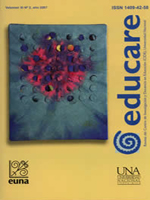Reforma e innovación educativa. Consideraciones teóricas para la investigación crítica
DOI:
https://doi.org/10.15359/ree.11-2.11Keywords:
Educational reform, educational innovation, teaching change, crisis of legitimacy, legitimacy strategy, critical hermeneutAbstract
In this essay we propose to do a critical approach to the education reform and innovation. Our interest is to examine the nature, ideological-political fundament and comparative characteristics between two manifestations of the educational change. To accomplish this task we initiate our exposition with an analysis of the principal sociohistoric framework of the beginning of the education changes and innovations: the technological boom of the eighties decade. In second place, we explore some fundamental characteristics, in comparative perspective, of education changes and innovations. In a third moment, we expos, in succinct way, some elements that we considerate basics to a hermeneutical and critical approach, to the models in theory of the educational changes. In the forth section, we move deeper in to the knowledge of the historical- structural dimension of the educational changes, as process witch take place in the changes of the social system. In the fifth and last part we do a theory excursus about the educational functions as sociostructural references to the education changes and innovations. This work is part of a process, that we systematize in other essays, with the intentions of contribute with elements to a critical hermeneutical vision of the process of educational changes. This is a product of the professorship “education, development and democracy: Uladislao Gámez Solano” of The Investigation and Teaching Education Center of the National University in Costa Rica.
References
Angulo, R. F. y Blanco, M. N. (1994). Innovación, cambio y reforma: Algunas ideas para analizar lo que está ocurriendo, teoría y desarrollo del currículo. Málaga: ALJIVE. Apple, Michel W. (1997). Educación y poder. Madrid: PAIDÓS.
Apple, Michel W. (2000). Teoría crítica y educación. Madrid.
Castells, M. (2002). La galaxia Internet. Barcelona: DEBOLSILLO.
Chalmers, A. (2000). ¿Qué es esa cosa llamada ciencia? Madrid: SIGLO XXI.
Colom, A. y Domínguez, E. (1997). Introducción a la política de la educación. Barcelona: ARIEL.
Eagleton, Terry (1997). Ideología una introducción. Barcelona: PAIDÓS.
Femández, S. y Pérez, M. (I 995). Política educativa y sociedad. Valencia: AU LLIBRES.
Fische, L. (1982). Tecnocracia. Diccionario de política. Madrid: TECNOS.
García Femández, M. (1998). Diseño, desarrollo e innovación del currículum. Córdoba: Servicio de Publicaciones, Universidad de Córdoba.
Gil V, Fernando (1994}. Teoría sociológica de la educación. Salamanca: AMARÚ EDICIONES.
González González, M. y Escudero Muñoz, J. (1987). Innovación educativa: Teoría y procesos de desarrollo. Barcelona: EDITORIAL HUMANITAS.
Habermas, J. (2001 ). Ciencia y técnica como ideología. Madrid: TECNOS.
Latapí, P. (1984). Análisis de un sexenio de educación en México, 1970-1976.
Lava! (2004). La escuela no es una empresa. Barcelona: PAIDÓS.
Levi, L., Bobbio, Norberto y Matteucci, N. (1982). Legitimidad. Diccionario de política. Madrid: TECNOS.
Mande!, Emest (1986). Las ondas largas del desarrollo capitalista. Madrid: SIGLO XXI.
Marcuse, H. ( 1972). El hombre unidimensional. Barcelona: SEIX BARRAL.
Miranda, G. (2006). Hacia una visión hermenéutico crítica de la política educativa, pp. 111-112.
Miranda, G. "Política curricular, crisis de legitimación y hegemonía neoliberal". En Revista de Ciencias Sociales. Nº 112-113 (no publicada). San José: Editorial Universidad de Costa Rica.
Moral, S. y Raymond, H. (1986). La acumulación del capital y sus crisis. Madrid, AKAL.
Ordóñez P., J. (2004). Introducción a la pedagogía. San José: EUNED.
Pérez G., Á. (1999). La cultura escolar en la sociedad neoliberal. Madrid: MORATA.
Guillermo Miranda Camacho Popkewitz, T. S. (1997). Sociología Política de las Reformas Educativas. Madrid. MORATA.
Postic, Marcel (1982). La relación educativa. Madrid: NANCEA.
Requeijo, J. (2000). Estructura económica mundial. Madrid: MC GRAW-HILL.
Rudduck, J., Angulo, R., Félix, J. y Blanco, N. (1994). Reflexiones sobre el proble-ma del cambio en las escuelas. En Teoría y Desarrollo del Currículo. Málaga: ALllVE.
Viñao, A. (2002). Sistemas educativos, culturas escolares y reformas. Madrid: MORATA.
Published
How to Cite
Issue
Section
License
1. In case the submitted paper is accepted for publication, the author(s) FREELY, COSTLESS, EXCLUSIVELY AND FOR AN INDEFINITE TERM transfer copyrights and patrimonial rights to Universidad Nacional (UNA, Costa Rica). For more details check the Originality Statement and Copyright Transfer Agreement
2. REUTILIZATION RIGHTS: UNA authorizes authors to use, for any purpose (among them selfarchiving or autoarchiving) and to publish in the Internet in any electronic site, the paper´'s final version, both approved and published (post print), as long as it is done with a non commercial purpose, does not generate derivates without previous consentment and recognizes both publisher's name and authorship.
3. The submission and possible publication of the paper in the Educare Electronic Journal is ruled by the Journal’s editorial policies, the institutional rules of Universidad Nacional and the laws of the Republic of Costa Rica. Additionally, any possible difference of opinion or future dispute shall be settled in accordance with the mechanisms of Alternative Dispute Resolution and the Costa Rican Jurisdiction.
4. In all cases, it is understood that the opinions issued are those of the authors and do not necessarily reflect the position and opinion of Educare, CIDE or Universidad Nacional, Costa Rica. It is also understood that, in the exercise of academic freedom, the authors have carried out a rogorous scientific-academic process of research, reflection and argumentation thar lays within the thematic scope of interest of the Journal.
5. The papers published by Educare Electronic Journal use a Creative Commons License:














 The articles published by Educare Electronic Journal can be shared with a Creative Commons License:
The articles published by Educare Electronic Journal can be shared with a Creative Commons License: 



